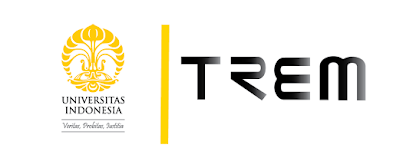sustainable development goal 12
Modifying consumption can reduce environmental impact and boost the economy. For a greener, inclusive world, resource guidelines are crucial. Universities can champion sustainable habits within their communities.
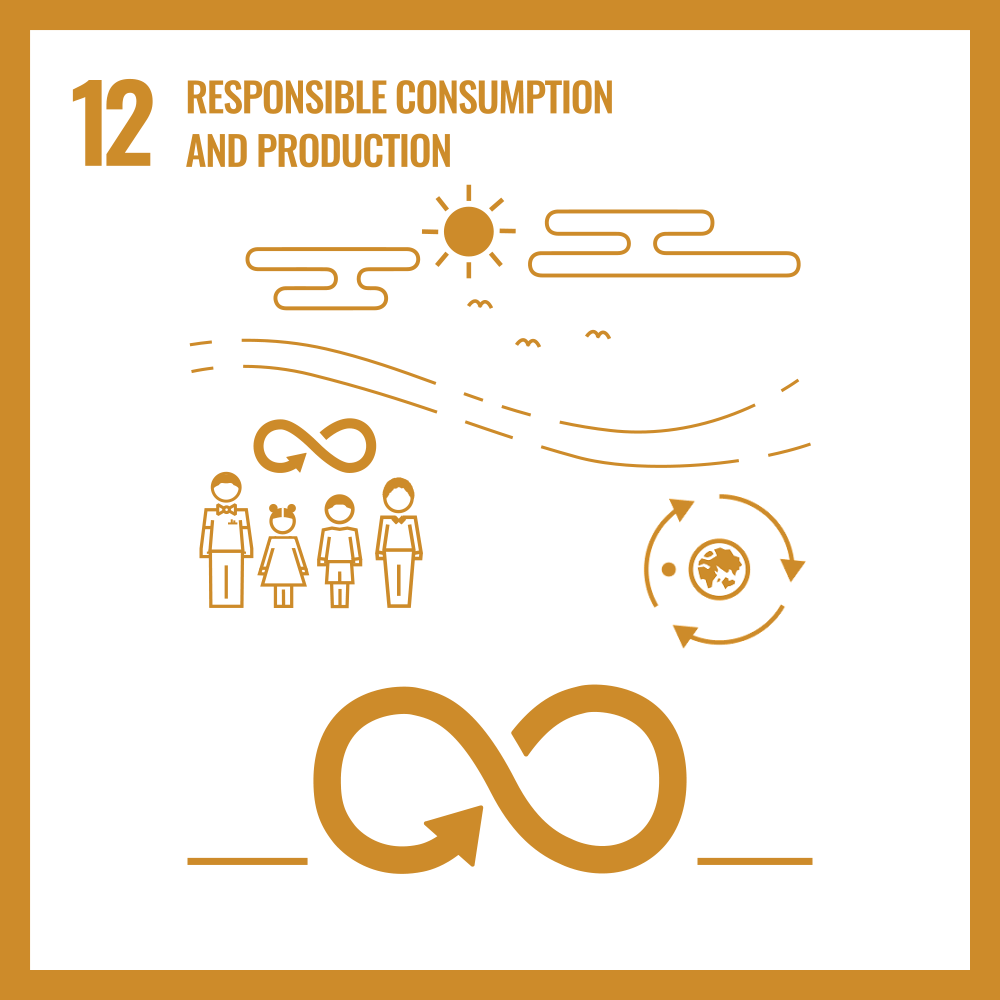
Universities advancing SDG 12, “Responsible Consumption and Production,” should implement sustainable practices like eco-friendly procurement, waste reduction, and energy efficiency. Embedding sustainability in curriculum and research, they educate and influence future leaders. Through innovative technologies and community outreach, universities not only practice but also promote a culture of sustainability, extending their impact beyond campus, shaping responsible consumption and production patterns in the wider community and industries.
Universitas Indonesia (UI) has long been known as a beacon of education in Indonesia, with an unwavering dedication to providing quality education and a supportive learning environment for the entire society of academicians. In upholding its commitment to creating a healthy and safe environment, UI implements an ethical sourcing policy in the process of procuring food and supplies on campus.
When talking about food and nutrition, safety and quality aspects are non-negotiable. In contemporary times that demand efficiency and speed, the importance of sustainability and ethics in the food procurement process has become a demand that every educational institution should meet. UI as one of the prominent universities in Indonesia truly comprehends the urgency of this matter.
One concrete reflection of this understanding is evident in Faculty of Psychology (FPsi) of UI and the Vocational Education Program (Vokasi) of UI. The canteens in these faculties serve as not only a place for society of academicians to fulfill their nutritional needs, but also a representation of the commitment of the faculties to health and sustainability. They ensure that every canteen meal served is not only delicious and nutritious, but also originating from ethical and sustainable sources.
In order to realize this vision, FPsi UI formulates healthy canteen service standards that should be adhered to by every tenant in the canteen area. The standards prioritize not only food safety aspects, but also integrity in the procurement process. Through this policy, the faculty aspires to ensure that the entire society of academicians receives quality, healthy, and sustainable food on campus.
Healthy Canteen Service Standards of Faculty of Psychology (FPsi) of UI
Likewise, Vokasi UI has an ethical policy in procuring food and supplies as specified in UI Rector’s Decree No. 057/SK/R/UI/2017 on the Implementation of Occupational Safety and Health (K3L) at UI Canteens issued on December 4, 2017. The food available in the canteen is first tested by the Environmental Health Laboratory of Faculty of Public Health (FKM) of UI. The food is deemed safe for consumption supposing it passes the test.
UI Rector’s Decree No. 057/SK/R/UI/2017 emphasizes that all food served in UI canteens should pass the test from the Environmental Health Laboratory. It is not just a routine inspection, but rather a guarantee that every food consumed by UI students, lecturers, and staff meets the highest quality standards. In addition to food safety, UI also considers the environmental and social impacts of the selected food sources. It is reflected in collaboration with partners committed to responsible practices, such as sustainable agriculture, the use of eco-friendly materials, and respect for the rights of the workers. It reflects the desire of UI to contribute to realizing a more just and sustainable world.
Not only food, UI also ensures that daily equipment used, from stationery to laboratory equipment, is obtained from responsible sources. It reflects the vision of UI to become a truly sustainable institution, in which every operational aspect considers social, economic, and environmental impacts.
Realizing the importance of a conducive campus environment, UI focuses on providing healthy and quality food as well as creating an atmosphere that supports the mental and physical well-being of students. Therefore, all faculties are empowered to create specific standards that fit their individual needs and characteristics.
This quality and integrity development shows that UI is not merely an educational institution. UI is also a forum that prepares the young generation to become future leaders with integrity, empathy, and a commitment to sustainability. Through this ethical sourcing policy, UI shows that every decision, no matter how small, has a significant impact and can be an example for numerous other institutions in Indonesia and around the world.
Policy Waste Disposal – Hazardous Materials
As one of the prominent universities in Indonesia, Universitas Indonesia (UI) fully understands its responsibility to practice sustainability in its daily operations. It is important not only as part of its educational mission, but also as an example for other communities and institutions in Indonesia on how to manage environmental impacts, particularly waste.
UI is committed to prioritizing sustainability principles in every aspect of its operations, including in hazardous and toxic (B3) waste management. Through this policy, UI ensures that any hazardous waste generated is managed in a safe, efficient, and responsible manner. In addition, by implementing standard procedures in its management, UI seeks to minimize the risk of environmental contamination and exposure to the community.
The hazardous waste management policy issued by UI covers various aspects from identification, sorting, collection, storage, transportation, to final waste handling. Through these steps, UI ensures that B3 waste is managed in compliance with appropriate standards and meets government regulations regarding hazardous waste management.
One of the faculties implementing and adapting this policy with high dedication is Faculty of Administrative Science (FIA) of UI and Faculty of Humanities (FIB) of UI. Hazardous waste management at FIA UI is implemented by considering the nature and characteristics of academic and research activities taking place at the faculty. Likewise, FIB UI is highly concerned about managing their waste. Considering numerous activities that have the potential to produce waste, FIA UI and FIB UI have established special procedures adjusted to the needs and conditions of their faculty environment.
The first measure taken by UI is to provide education to the entire society of academicians regarding the dangers of waste and the importance of proper waste management. Thus, every individual on campus has awareness and responsibility in ensuring proper management of any waste generated. This education does not only take the form of training or workshops, but also through regular lecture materials, discussions, and seminars.
Waste Management at Faculty of Psychology (FPsi) of UI
Furthermore, UI also implements a stringent system in B3 waste management, starting from separating waste at the source, giving special labels, to storing it in Temporary Storage Areas (TPS) that meet safety standards. It is to ensure that no leakage or contamination can occur and harm the surrounding environment during the storage process.
However, the role of UI does not stop with internal management. In the further waste management process, UI collaborates with competent and licensed third parties. This collaboration ensures that the waste generated from campus activities is processed using correct and safe methods in accordance with the applicable regulations. In addition, this collaboration is also a form of transparency from UI to show the commitment to carrying out its social and environmental responsibilities.
The commitment of UI to waste management is also reflected in the investment in technology and infrastructure. For example, the wastewater treatment system at Faculty of Dentistry (FKG) of UI designed to remove medical contaminants is concrete evidence that UI does not hesitate to invest in technology that supports sustainability.
Waste Water Treatment at Faculty of Dentistry (FKG) of UI
Through the efforts in B3 waste management, UI shows that it does not only teach the theories, but also implements the sustainable and responsible practices. As an educational institution, UI has proven its commitment to being a pioneer in the efforts of environmental conservation and sustainable development in Indonesia.
Policy Waste Disposal – Landfill Policy
Universitas Indonesia (UI), as the prominent higher education institution in Indonesia, places environmental sustainability as one of its priorities. In this context, waste management policy is an important instrument that supports this commitment. Supported with the spirit of promoting environmental sustainability, UI implements a comprehensive waste management policy, which includes organic, inorganic, as well as hazardous and toxic waste (B3).
Waste sorting is a crucial starting point in sustainable waste management. UI has instilled and implemented an understanding of the importance of waste sorting from the source. Every faculty or work unit at UI is equipped with special containers categorized based on the type of waste, namely inorganic and organic. This separation aims to facilitate the subsequent management process, considering that the two categories of waste require different treatment. Each community member is expected to be able to differentiate and dispose of waste according to its category, as a form of shared responsibility in preserving the campus environment.
Training is part of the socialization of waste management organized in all UI faculties and carried out directly by Zamrowi from the Office of Cleanliness and Parks of Depok. In the training, Zamrowi did not only convey the theory, but also provided direct practices on effective waste sorting. In addition, the Waste Bank concept was introduced as a creative solution in waste management. Waste Bank provides the community with the opportunity to “save” their waste. Every waste saved will be weighed and rewarded with a certain amount of money. This model creates incentives for the community to be more active in proper waste management. However, the implementation of this policy is not without reason. The Depok City Government, through its Regional Regulation, has implemented an exemption from waste service fees on the condition that waste sorting should be implemented. Institutions that do not comply with these rules will be subject to fines. Through this measure, UI also attempts to improve the quality of work and life of its employees.
This series of policies indicates the commitment of UI as not only an educational institution generating high-achieving graduates, but also part of the community that plays an active role in environmental conservation. It shows that UI truly understands the importance of balancing scientific progress and environmental sustainability.
Policy For Minimisation Of Plastic Use
Universitas Indonesia (UI), as one of the oldest and most prestigious educational institutions in Indonesia, has committed to not only providing quality education but also playing an active role in maintaining environmental sustainability. Based on the awareness of the negative impact of using plastic on the environment, UI has implemented various policies to minimize plastic use in its campus environment.
UI realizes that reducing plastic use is not an easy task, but is a pivotal measure to preserve nature. Therefore, UI issues UI Rector’s Decree No. 1308/SK/R/UI/2011 on paper and plastic use. This policy is not only limited to reducing the use of single-use plastic, but also encouraging the entire society of academicians to switch to reusable products.
Faculty of Public Health (FKM) of UI has been a pioneer in implementing a program to reduce paper and plastic use. This program involves the implementation of various technologies, such as drinking water filtration machines available for use by the society of academicians, thereby reducing the need for single-use plastic bottles. In addition, this faculty has also developed the Student Letter Request (PEMIRSA) application which allows the digital process of requesting letters and other documents to, thereby reducing the need for paper.
Furthermore, Faculty of Administrative Science (FIA) of UI also has issued its own policy to reduce paper and plastic use. This policy was formulated to create a zero plastic and green campus environment that UI aspires to. This decision is regulated in the Decree of the Dean of Faculty of Administrative Science (FIA) No.: SK-25/UN2.F16.D/HKP.02.04/2022
UI does not stop at implementing internal policies. As a university with a strong influence in the community, UI also strives to educate and spread awareness about the importance of reducing plastic use to the wider community. UI realizes that real change can only occur supposing all elements of the community unite to take a concrete action. For instance, the Waste for Scholarship program initiated by the Student Executive Board (BEM) of Faculty of Psychology (FPsi) of UI, whose funds come from the conversion of electronic and paper waste.
The measures taken reflect the commitment of UI to supporting the achievement of Sustainable Development Goals (SDGs), specifically those related to environmental sustainability. By reducing plastic use, UI aspires to provide a real contribution to environmental conservation and create a better world for future generations. UI realizes that the journey to achieve an environment free of plastic waste is still long. However, with transparent policies, support from the entire society of academicians, and concrete efforts, UI is confident to be on the right track towards creating a sustainable and eco-friendly campus environment.
Policy For Minimisation Of Disposable Items
In this increasingly modern era, the issue of environmental sustainability has become one of the main focuses of numerous institutions, including Universitas Indonesia (UI). As one of the prominent universities in Indonesia, UI has committed to reducing its ecological footprint through various policies that limit the use of single-use items, particularly plastic and paper.
Referring to UI Rector’s Decree No. 1308/SK/UI/R/2011, UI has established an in-depth policy regarding plastic and paper use reduction throughout its campus environment. This policy is not a mere declaration, but is translated into a series of concrete actions involving the entire society of academicians.
UI realizes that to achieve the target of reducing plastic and paper waste, there needs to be collective awareness and active participation from all components of the university. Therefore, all the policies and decisions of the rector have been issued as a follow-up, urging all UI faculty members to:
All faculties, vocational programs, and schools at UI have also issued specific policies related to plastic and paper use reduction, several of which include:
The aforementioned policies reflect the commitment of UI to environmental conservation as well as a concrete form of the role of UI in supporting government programs and improving its GreenMetric ranking on the international stage.
UI Rector’s Decree No. 2893 of 2018 on UI Green Campus Policy
Considering the importance of maintaining the balance of nature and the environment, the measures taken by UI are expected to be an example and inspiration for other institutions. By adopting progressive and sustainable policies, UI aspires to have a positive impact on the surrounding environment and create a generation conscious of environmental sustainability. In addition, by inviting the involvement of the entire society of academicians, UI believes that efforts to reduce single-use items will be more effective and provide significant results for the environment.
Disposable Policy: Extensions To Services
As a prominent educational institution in Indonesia, UI understands the importance of participating in maintaining environmental sustainability. Therefore, every faculty, unit, and school under UI has strived to implement waste management and plastic use reduction policies.
As specified in UI Rector’s Decree regulating waste management, every faculty, unit, and school is motivated to adopt responsible waste management practices. It includes providing waste containers according to categories, regular transportation to local Temporary Disposal Areas (TPS), and further management such as organic waste composting. Even hazardous waste is managed strictly through special procedures.
The “Zero Plastic” program launched by UI shows the commitment of UI in the efforts to minimize the negative impact of single-use plastic. Every element of the campus, from students, lecturers, employees, to third parties involved, is expected to actively participate in this program.
Considering all measures that have been taken, UI has the ambition to be not only an eco-friendly campus, but also an example for other institutions in terms of environmental sustainability. Through the policies implemented, UI wants to show that every individual can contribute to environmental conservation efforts and a significant positive impact can be achieved collaboratively.
Minimisation Policies Extended To Suppliers
Universitas Indonesia (UI) is not only an educational institution, but also an entity that plays an important role in maintaining environmental sustainability. Amidst its commitment to be an agent of change in environmental issues, UI has taken various concrete steps through policies implemented within its campus environment.
One example of policies adopted by UI is reducing paper and plastic use. UI Rector’s Decree No. 1308 of 2011 is the foundation for this policy, which aims to reduce the negative impact of using paper and plastic on the environment. UI is committed to reducing dependence on paper and plastic as well as promoting more sustainable practices in the use of these materials.
UI Rector’s Decree No. 1308 of 2011 on the Policy to Reduce Paper and Plastic Use in UI Campus
Furthermore, UI also considers the importance of becoming a green campus that pays attention to environmental aspects in all aspects of its operations. UI Rector’s Decree No. 2893 of 2018 on UI Green Campus Policy is the main foundation for this effort. Through this policy, UI seeks to create an eco-friendly campus environment, adopt more sustainable practices in the use of resources, and pay attention to sustainability aspects in the construction and maintenance of the campus environment.
UI Rector’s Decree No. 2893 of 2018 on UI Green Campus Policy
A further policy implemented by UI is the Zero Plastic program as stated in UI Rector’s Decree No. 4 of 2019. Within this framework, UI is committed to reducing plastic use in the campus environment, as well as promoting the use of more eco-friendly alternatives. It includes reducing the use of single-use plastic bags, as well as campaigning for the use of reusable or recyclable products.
UI Rector’s Decree No. 4 of 2019 on UI Zero Plastic Program
In addition to focusing on practices that have a direct impact on the campus environment, UI also considers the importance of expanding these sustainability policies to suppliers and the supply chain. It includes suppliers providing equipment, stationery, building contracts, and various other components required in UI operations. By integrating sustainability principles into the relationships with suppliers, UI aims to ensure that eco-friendly practices are also adopted by external parties partnering with the university. It is a further step in the commitment of UI to be an agent of change in environmental issues, not only within its own campus, but also throughout the supply chain and suppliers involved.
In an effort to maintain environmental sustainability, UI does not only focus on internal practices, but also takes important measures in expanding the policy of minimizing the use of single-use items and implementing eco-friendly principles throughout the supply chain. It includes all suppliers involved in providing equipment, stationery, building contracts, and other components used by UI. UI ensures that every supplier partnering with the university complies with the established environmental standards. In every cooperation agreement, clauses related to sustainability and environmental responsibility are introduced and should be complied with.
For example, in relations with the equipment suppliers, UI emphasizes that the equipment provided should be eco-friendly, having high energy efficiency, and producing little waste. Meanwhile, stationery suppliers are instructed to reduce the use of plastic packaging, while promoting recyclable or biodegradable products. Contractors involved in construction projects on campus are required to implement eco-friendly green construction methods, reduce construction waste, and utilize sustainable materials.
Therefore, UI does not only take measures within its own campus environment, but also plays an active role in influencing sustainability practices throughout the supply chain and external partners. It indicates the commitment of UI to maintaining environmental sustainability and promoting the principles of social and environmental responsibility in all aspects of its operations. Sustainability is the main focus manifested in concrete policies such as Circular No. 2771 of 2022, Official Memorandum No. 7185 of 2022, Decrees of the Dean of Faculty of Engineering (FT) of UI No. 1603 of 2013, and Decree of the Director of Vocational Education Program (Vokasi) of UI No. 114 of 2018. These are crucial measures in the journey of UI towards better environmental sustainability.
In the long term, UI hopes that these initiatives can inspire other institutions, both in the educational and industrial sectors, to participate in environmental conservation efforts. UI believes that sustainable development goals can be achieved only through close cooperation and collaboration between all parties. Considering the increasing public awareness about the importance of environmental conservation, UI stands at the forefront to encourage positive changes in the educational sector. Through proactive and collaborative policies, UI shows that higher education can play an important role in creating a greener and more sustainable future for future generations.
Universitas Indonesia (UI), one of the elite educational centers in this country, has scored achievements not only in the academic field, but also in its commitment to environmental conservation. UI is well aware that the hectic daily teaching and learning activities contribute to the accumulation of waste. Therefore, UI implements an integrated and sustainable waste management system.
Not only limiting itself to standard waste management, UI ensures that every type of waste, from organic, inorganic, to hazardous and toxic waste (B3), is managed properly according to its characteristics and impact on the environment. This initiative starts with sorting waste directly from the source. UI has ensured that each faculty and work unit has special trash bins according to the category of waste produced. Organic waste, which mostly comes from food scraps, leaves, and other organic materials, is collected and then processed in the UI compost house. This effort is supported by biomass technology applied at Parangtopo Laboratory, producing biogas and compost which are beneficial for the sustainability of the campus ecosystem. Meanwhile, subsequent to undergo the sorting stage, inorganic waste will be distributed to waste banks. Some is even sold to third parties as a reuse effort. Non-recyclable waste will be taken to the Final Disposal Site (TPA) using safe and eco-friendly procedures.
Through the Waste to Energy Laboratory of Faculty of Mathematics and Natural Sciences (FMIPA) of UI, leaf waste and other organic waste are processed through biodigester tubes. The results of this process, i.e. methane gas and probiotic sludge, are concrete witnesses of the efforts of UI to process waste into alternative energy and organic fertilizer. The waste measurement process in the faculty, performed by janitors under the Unit of Facilities, is an important instrument to ensure the effectiveness of the waste management program. Each waste is measured, recorded, and analyzed for future evaluation and improvement of the system.
All these initiatives and efforts show that UI not only contributes to environmental conservation, but also becomes an inspiration and an example for other institutions. The enthusiasm of UI for waste management is in accordance with its mission to become a sustainable and environment-conscious university.
The “Proportion of Recycled Waste” quantifies the percentage of waste effectively recycled and reused, playing a vital role in SDG 12, “Responsible Consumption and Production.” This metric underscores efforts towards sustainable waste management by minimizing landfill usage, reducing resource depletion, and cutting down environmental pollution. Achieving higher recycling rates is essential for sustainable development, necessitating enhanced recycling technologies, effective waste segregation systems, and widespread public awareness and participation in recycling initiatives.
The “Publication of a Sustainability Report” is pivotal for SDG 12, “Responsible Consumption and Production.” This practice involves organizations disclosing their environmental, social, and economic impacts, demonstrating transparency and accountability in sustainable practices. Such reports assess progress towards eco-friendly operations, responsible resource use, and social responsibility. They guide policy-making, inform stakeholders, and foster a culture of sustainability, aligning corporate actions with global goals for sustainable development and responsible production.
Publication Of A Sustainability Report
Universitas Indonesia (UI) has a great responsibility to always be transparent in conveying its efforts and progress in terms of sustainability to the community. Not only as a form of accountability, but also as a form of education to the community regarding the importance of environmental sustainability in every aspect of life.
An effective way to convey sustainability efforts and achievements is through the publication of sustainability reports. Public Relations (PR) of UI publishes environmental sustainability reports every year through its official website. It provides a clear picture to the public regarding the measures that have been taken, the achievements that have been obtained, and the challenges faced in the efforts to achieve the Sustainable Development Goals (SDGs).
Sustainability reporting is essential in this era of sustainability. This report is not only a means of reporting, but also a reflection of the commitment and efforts made by an institution in implementing sustainable practices. UI, as a prominent higher education institution, understands the importance of this and has integrated sustainable concepts into its vision and mission. UI demonstrates its commitment to supporting SDGs through various initiatives that have been implemented.
The importance of sustainable reporting is emphasized by transparency and accountability. When UI faculties, such as Faculty of Engineering (FT) of UI, Faculty of Medicine (FK) of UI, Faculty of Public Health (FKM) of UI, Faculty of Humanities (FIB) of UI, and Faculty of Psychology (FPsi) of UI, publish their ongoing reports, it shows that they are not only talking, but also taking action. By including qualitative and quantitative data, these reports become a credible source of information for stakeholders, both internal and external.
In addition to sustainability reports, research and journal publications also have a crucial role in illustrating the commitment and contribution of an educational institution to global sustainability. Vocational Education Program (Vokasi) of UI conducts research and writes journals related to sustainability reports to show not only their innovation and academic quality, but also their commitment to contributing to sustainability efforts.
An example is research on “Seeking the Opportunities and Challenges of Blue Economy Sustainable Development: A Case Study of Sidoarjo, Indonesia.” This research reflects how Vokasi UI attempts to understand the potential and challenges of the blue economy in Indonesia, which has a direct impact on the sustainability of fisheries and coastal resources.
Next, research on “Hybrid energy to drive renewable energy diversity in bibliometric analysis” highlights the importance of renewable energy diversification. Employing bibliometric analysis, Vokasi UI seeks to map developments and trends in renewable energy research, providing important information for decision makers in the energy sector.
Hybrid Energy to Drive Renewable Energy Diversity in Bibliometric Analysis
The success of each UI faculty and vocational program in integrating SDGs is concrete evidence of the enthusiasm of UI for contributing to global sustainability efforts through curriculum, research, collaboration with various parties, or implementation of sustainable practices on campus. The ongoing reports from these faculties are important documents that reflect the dedication and commitment of UI to achieving the SDGs and becoming an inspiration for other universities.
UI, with the commitment and efforts that have been made, demonstrates that sustainability is not a mere slogan or campaign, but also an integral part of the vision and mission of the university. Through various initiatives that have been conducted, ranging from research, teaching, to practices on campus, UI aspires to provide inspiration and concrete examples for numerous parties to collectively contribute to efforts to achieve SDGs.
Therefore, the publication of sustainability reports by UI confirms its position as an educational institution that is highly committed to environmental conservation and sustainable development. It is an important measure in ensuring that future generations will inherit a better, greener, and more sustainable world.
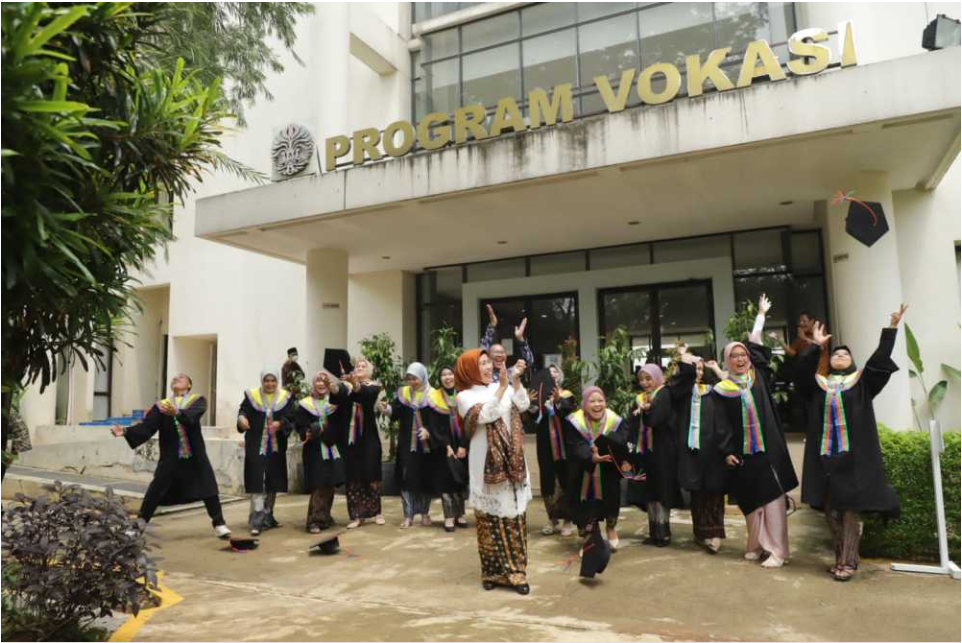
A total of 13 students who won the Serang Regency Government Vocational scholarship at the University of Indonesia graduated and immediately went to work at the Dr. Drajat Prawiranegara Hospital (RSDP).
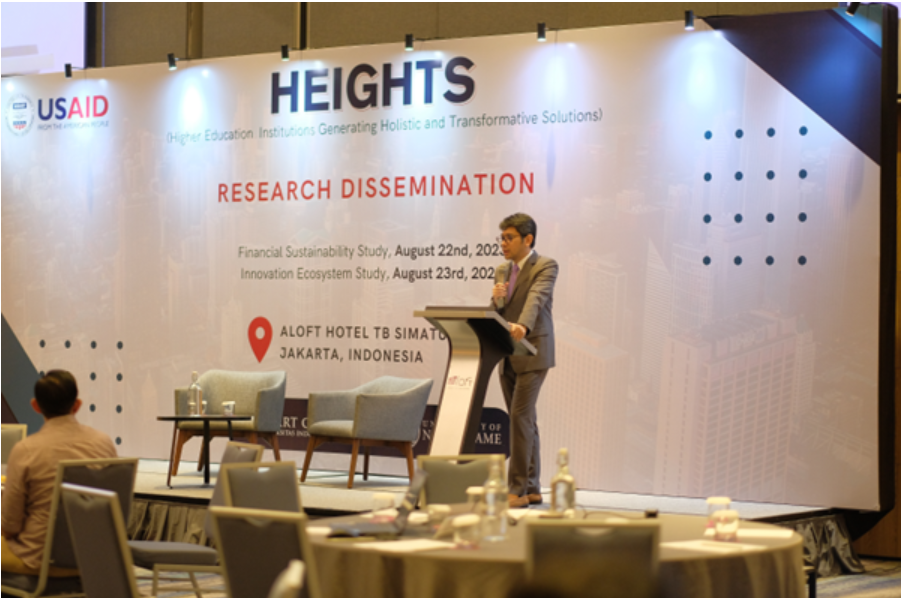
Smart City Universitas Indonesia (UI) collaborated with the University of Notre Dame and the United States Agency for International Development (USAID) to conduct research on the role of universities in creating a dynamic agricultural innovation ecosystem in West Java.
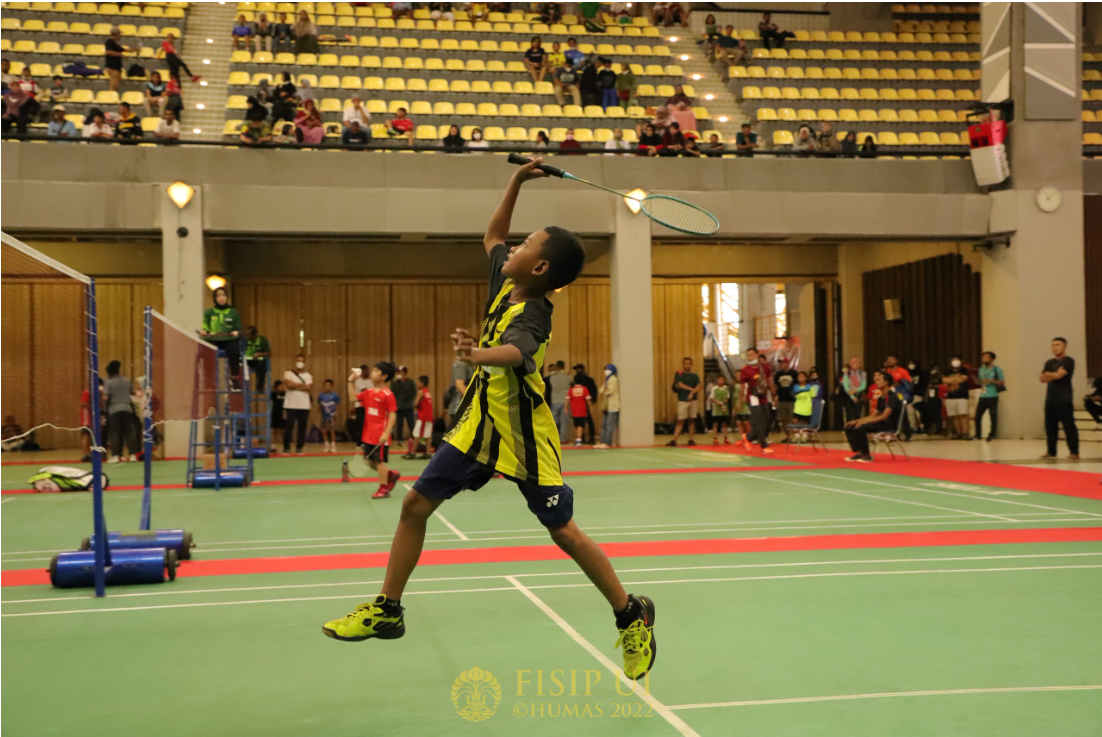
The Faculty of Social and Political Sciences UI, as an implementation of the Tri Darma of Higher Education, organizes integrated social programs through sports activities. It is a Badminton Championship event organized by FISIP which is attended by 511 badminton athletes.
